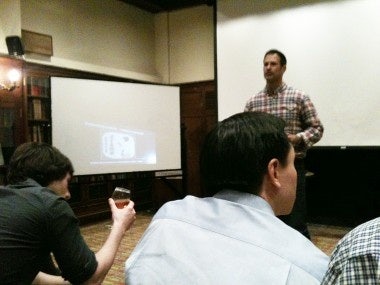First Evidence Of Fermented Grain Beverage Found At Jiahu, Modern-Day Henan Province In 1962#

Last night, Jing Daily had the privilege of attending the first installment of the "Archaeology of Beers: Tastings of Ancient Ales" lecture series at the China Institute in New York, hosted by Sam Calagione of Dogfish Head Brewery and Dr. Agnes Hsu, the China Institute’s Resident Scholar and Consulting Archaeologist to the UNESCO World Heritage Center. Taking us through the history of brewing across different cultures and throughout history, the Dogfish Head beers and stories shared by Calagione and historical background presented by Hsu provided attendees with an educational experience that engaged all five senses.
Introducing his company and its mission, Sam Calagione kicked off the evening by treating attendees to a glass of Midas Touch -- a recreation of proto-beer residue discovered in Turkey in the tomb of King Midas. First brewed in 2000, Midas Touch was Dogfish Head's first collaboration with Dr. Patrick McGovern of the University of Pennsylvania, one of the pioneers in the field of molecular archaeology, and remains one of the brewery's most awarded beers. Since pairing up with Dr. McGovern in the late 1990s after an introduction from the late beer writer Michael Jackson, Dogfish Head has developed two ancient ales in addition to Midas Touch: Theobroma and Chateau Jiahu. Discussing his 15-year-old company's interest in resurrecting ancient brews, Calagione said he's always found it interesting that the two most common items found by archaeologists at ancient gravesites are remnants of food and some form of alcohol.
Discussing the process of "cloning" ancient beers found at archaeological sites, Calagione pointed out that the molecular analysis performed on pottery shards by Dr. McGovern produces only a list of ingredients, rather than a precise recipe, so the Dogfish brewing team "takes some liberties" with the final brew. For example, ancient brewers, unaware of the existence of yeast, would have relied on wild yeasts for fermentation, and the final "beers" would likely have been consumed only days after the beginning of fermentation. Since this type of brewing is far too unpredictable -- and the end results would likely be unpalatable for modern drinkers -- re-creating beers like Midas Touch meant some tactical brewing decisions on the part of Dogfish Head. In the case of Midas Touch, this translated to filtration (in order to preserve a golden color befitting the tomb of King Midas), while Theobroma and Chateau Jiahu remain unfiltered, true to form.
The next beer shared at the tasting was Theobroma ("food of the gods"), based on a fermented grain beverage discovered in the Aztec region of Central America. Made with cacao nibs and powder, ancho chiles, honey, barley and annatto seed, Theobroma is rich and complex. Next, to switch the evening up a bit, came Palo Santo -- not an Ancient Ale, but a 12% alcohol pitch-black ale brewed in barrels made from Paraguayan palo santo ("holy stick") wood, one of the world's heaviest and densest woods, the resins of which impart an unusual but spellbinding aftertaste that linger on the tongue long after the last sip. Sam Calagione explained that Dogfish Head can only brew around 12 batches of Palo Santo per year, as it must be aged for one month in the brewery's only palo santo wood barrel.

Finally came Chateau Jiahu, arguably the star of the show. Based on chemical analysis of resins discovered in the 1960s at a 9,000-year-old Neolithic tomb at Jiahu, China (modern-day Wuyang, Henan province), Chateau Jiahu is a reinterpretation of the oldest non-grape-based fermented beverage ever discovered by archaeologists. The beer includes hawthorn berries, grapes, honey, chrysanthemum flowers and sake yeast, the end result being a relatively light (for a 9% alcohol beverage), nicely carbonated beer with the slightest hint of fruit. The perfect segue to Dr. Agnes Hsu's presentation on the Jiahu archaeological site and its importance in the field of Neolithic studies.
Hsu began by pointing out that the Jiahu site is a key archaeological find for more than one reason. Besides evidence of the aforementioned fermented beverage, the tomb at Jiahu -- located between Beijing and Shanghai, on the Yellow River in what is now Henan province -- also held the first musical instrument ever discovered by archaeologists. This, Hsu said, means the 9,000-year-old site indicates the first stirrings of the "Neolithic Revolution" in the Far East, when humans made the transition from hunting and gathering to forming agrarian societies with division of labor, agricultural cultivation, language, and personal possessions. Also, the extinct form of rice found at Jiahu makes this one of the earliest (and most northern) sites in the world with evidence of rice cultivation, and the "proto-grape" used in the beer-like substance indicates either a cultivation of this fruit at Jiahu or some form of trade.
Other interesting findings at Jiahu, and what ties this all back to Dogfish Head's Chateau Jiahu ale, are the musical instruments found at the site. Made from crane bones, the presence of these early flutes indicate the importance of music, as well as early alcoholic beverages, in the social lives of ancient humans. By reimagining and resurrecting Chateau Jiahu, Theobroma and Midas Touch, Dogfish Head looks to not only make a refreshing and unique product, but one that reminds us that the act of enjoying a drink among friends and loved ones is a universal act, one that that stretches back thousands of years and speaks to the fundamental elements that make us all human.
The second installment of the China Institute's "Archaeology of Beers" series, featuring Dr. Patrick McGovern, will take place on Friday, December 17 from 6 – 8 PM. Be sure to book early, as this event will sell out.
The Jing Daily team would like to thank Dr. Agnes Hsu of the China Institute and Sam Calagione of Dogfish Head Brewery for organizing this event and sharing their knowledge (and craft beer) with us.